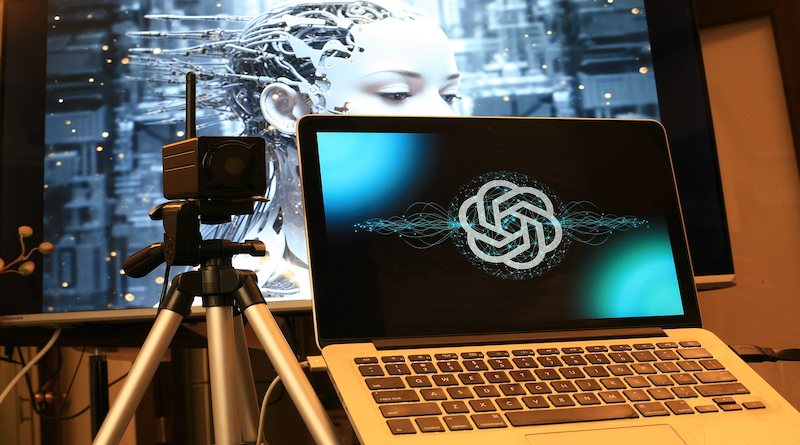The Role Of Artificial Intelligence To Make Human Work Easier – OpEd
The exciting field of artificial intelligence (AI) is the development of intelligent computers that are capable of carrying out tasks that ordinarily demand human intelligence. It entails creating models and algorithms that let computers reason, learn from data, and make judgments. Applications of Artificial intelligence can be found in many fields, including banking, healthcare, and transportation. The way Artificial Intelligence is changing the world is incredible.
Artificial intelligence has a rich history that spans decades. It began in the 1950s with the development of early Artificial Intelligence programs. Over time, Artificial intelligence evolved with breakthroughs in machine learning and neural networks. In recent years, Artificial intelligence has made significant advancements in areas like natural language processing and computer vision. Today, Artificial Intelligence is transforming industries and shaping our future and making human works easier.
There are quite a few awesome Artificial intelligence application examples, Virtual assistants like Siri and Alexa, recommendation engines that make product or movie suggestions based on your tastes, self-driving cars, face recognition technology, and even chatbots with Artificial Intelligence (AI) are a few examples of popular ones. Artificial Intelligence is also utilized in finance to detect fraud and in healthcare to diagnose illnesses. The way Artificial Intelligence is being applied across a range of industries to improve efficiency and ease our lives is amazing!
The way we engage with and consume media has been completely transformed by Artificial Intelligence-powered technologies like computer vision, image and audio recognition, and natural language processing. Our ability to swiftly process and evaluate enormous volumes of data thanks to Artificial Intelligence makes it simpler to locate and obtain the information we require.
Here are some further details regarding Artificial intelligence and its impact on human life.
1. Enhanced Efficiency: Artificial intelligence saves time and energy by automating routine tasks. It helps businesses streamline operations and improve workflow.
2. Personalized Experiences: Artificial intelligence systems examine our inclinations and actions to offer customized suggestions for movies, music, fashion, and other areas. It makes us happier and more convenient.
3. Improvements in Healthcare: AI helps with disease diagnosis, picture analysis, and customized treatment planning. It improves diagnosis, increases accuracy, and improves patient outcomes.
4. Enhanced Safety: AI is used in a number of safety applications, such as autonomous vehicles for safer transportation, facial recognition for security, and predictive analytics for crime prevention.
5. Language Translation: By removing language barriers, Artificial intelligence-powered translation systems improve communication and collaboration between individuals from various cultural backgrounds.
6. Virtual Assistants: Artificial intelligence-driven virtual assistants that assist us with tasks, provide answers to inquiries, and manage smart devices enhance our quality of life. Examples of these assistants are Siri, Alexa, and Google Assistant.
7. Education and Learning: Artificial Intelligence is revolutionizing the field of education by offering intelligent tutoring programs, adaptive evaluations, and unique learning experiences. It promotes learning and customizes instruction to meet each student’s needs.
These are just a few examples of how Artificial Intelligence has improved human lives.
Artificial Intelligence has been applied in a variety of ways in business to improve decision-making and operations. Common uses for artificial intelligence include:
1. Customer service: Artificial Intelligence-driven chatbots and virtual assistants may respond to questions from customers, offer assistance, and help process orders, all while enhancing the customer experience and speeding up response times.
2. Predictive Analytics: By analyzing past data, Artificial Intelligence is able to predict future patterns and behaviors. This aids companies in forecasting sales accurately, anticipating client needs, and optimizing inventory management.
3. Fraud Detection: Artificial Intelligence (AI) systems are able to recognize trends and irregularities in financial transactions, assisting companies in identifying and stopping fraudulent activity to safeguard their clients and themselves.
4. Supply Chain Optimization: Artificial Intelligence may enhance supply chain operations through demand forecasting, inventory optimization, and better delivery and logistics, all of which lower costs and increase efficiency.
5. Personalized Marketing: By delivering targeted and customized marketing campaigns based on consumer interests, behaviors, and demographics, firms may increase customer engagement and conversion rates. Artificial intelligence facilitates this process.
6. Process Automation: By streamlining manual and repetitive processes like data input, document processing, and inventory management, AI-powered automation can free up staff members to concentrate on more strategic and creative work.

